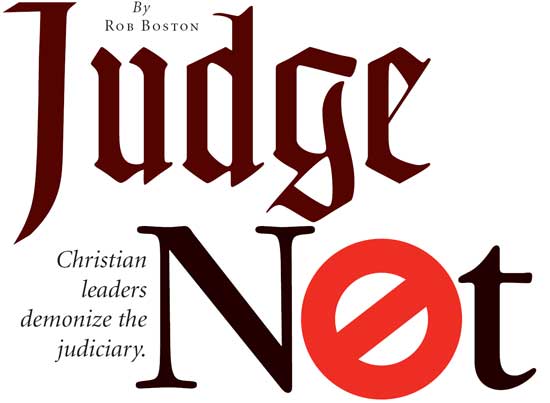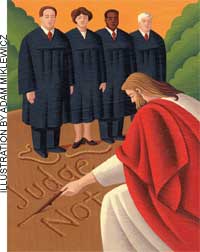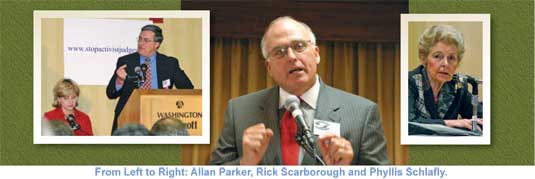Judge Not
Rob Boston September/October 2005
Getting your Trinity Audio player ready...

The Reverend Rick Scarborough is a Texas minister with big dreams of the national stage. Welcoming attendees to a recent gathering in Washington, D.C., the stocky ex-college football player said bluntly, "This is perhaps the most important conference in the city of Washington this year."
The topic of this momentous occasion wasn't terrorism, the economy, or global warming. Rather, the event, as described by Scarborough, would target "renegade judges who exceed their constitutional authority."

Under the fancy name lies an organization with big—some would say radical—ideas: The federal courts, Scarborough and his supporters argue, have become an unelected, out-of-control oligarchy of black-robed elitists who must be made to give quarter. The conference was designed to find the best way to do that.
"This nation cannot long exist in the vacuum of atheism that is being forced on us by the court," Scarborough declared.
There is, however, one problem: The United States has long operated under the separation of powers. The three branches of government—executive, legislative, and judicial—are coequal but exercise checks and balances over one another. Thus critics say what Scarborough is proposing is nothing short of a revolution: bringing the courts under the sway of Congress would destroy that delicate balance and strike at a core principle of U.S. government.
None of this fazes Scarborough. To Scarborough and his supporters, issues such as same-sex marriage, abortion, prayer in the public schools, display of religious symbols by government, and others define the national character. They've seen many of their legislative efforts in these areas ified by the courts. Even a Supreme Court with seven of nine members nominated by Republican presidents has failed to produce rulings that please the Religious Right. The answer, they are increasingly saying, isn't to change the courts; it's to neuter them.
At Scarborough's meeting that meant one thing: impeaching offending judges.
It was a theme reiterated again and again by the speakers, who did not hesitate to name names. An angry Michael Schwartz, chief of staff for U.S. senator Tom Coburn (R-Okla.), blasted U.S. appeals court judge Stanley F. Birch, Jr., who incurred Religious Right wrath for chastising Congress for intervening in the controversy over Terri Schiavo.
"He needs to be impeached," Schwartz declared. Schwartz also blasted U.S. district judge James Whitmore, who also ruled against Congress' intervention, saying the judge should be removed from the bench "forthwith."
"I hope they serve long sentences," Schwartz added.
It's easy to dismiss such talk as the rumblings of a lunatic fringe. But although attendance at the April 7-8 Washington, D.C. gathering, titled "Confronting the Judicial War on Faith," was low—only about 200 people showed up—the antijudge hatefest caught the attention of some powerful people.
House majority leader Tom DeLay was scheduled to address the event in person but was called away at the last minute to attend the funeral of Pope John Paul II. DeLay sent a supportive videotape, and two others members of Congress, as well as leaders of national Religious Right groups and Senate staffers, attended in person.
During his videotaped remarks DeLay included a token line calling for a respectful dialogue—but the bulk of his comments poured gasoline on the fire.

Blasting recent court rulings, DeLay said, "These are not the dictates of a mature society but a judiciary run amok. The failure is to a great degree Congress's. The response of the legislative branch has mostly been to complain. There is another way, ladies and gentlemen, and that is to reassert our constitutional authority over the courts."
With DeLay's help, conference organizers have big plans to ditch some powerful judges—starting at the top.
Their main target is Anthony M. Kennedy, appointed by President Ronald W. Reagan in 1988, and a devout Roman Catholic. Kennedy is no ACLU member when it comes to the separation of church and state; he has repeatedly voted to approve various types of taxpayer aid to religious institutions.
Yet the justice's conservative outlook on many issues means nothing to Scarborough's group. Kennedy has also voted to support legal abortion, in favor of gay rights, and against government-sponsored prayer in schools, stands that have made him a traitor in the eyes of the Religious Right.
Kennedy, said homeschooling advocate Michael Farris, "should be the poster boy for impeachment."
What if Congress balks? Farris has an answer for that, too.
"They ought to be impeached as well," he said. "We need to hold them to that standard."
Another speaker, Edwin Vieira, author of a book titled How to Dethrone the Imperial Judiciary, went even further. Asserting that "the fifth fool on the Supreme Court decides the issue and then according to them. . . everyone else in the world is bound by this decision," he blasted the Supreme Court for promoting "Marxism-Leninism-Stalinism."
Vieira approvingly quoted Joseph Stalin, whom he called "the greatest political figure of the 20th century."
Stalin, Vieira noted, had a solution for dealing with his enemies: "He had a slogan, and it worked very well for him whenever he ran into difficulty. 'No man, no problem.' . . . This is not a structural problem we have, this is a problem of personnel. We are in this mess because we have the wrong people as judges, and we have the wrong people as judges because we have the wrong people as legislators."
Speaker after speaker advocated similarly radical steps to rein in the judiciary. Impeachment was the hands-down favorite approach. Allan Parker, founder of the Texas Justice Foundation, was blunt. "What it is time to do is impeach judges, and I advocate the standard not just to be pro-life or any particular case," Parker said. "The standard should be any judge who believes in the 'living Constitution' should be impeached. Many of them have written this explicitly. It would be easy to document. . . . That's the standard, and it's time for impeachment."
Addressing a panel on "Remedies to Judicial Tyranny," Farris told the crowd, "Impeachment needs to be a serious reality, and I'm going to name some names."
To this crowd, impeachment is the perfect weapon of intimidation. "About 40 of them [federal judges] get impeached, you know, suddenly these guys would be retiring and going into private law practice, which would be, you know, happy days are here again," Farris told the crowd.
As a fail-safe in case impeachment is not enough, Farris also called for giving Congress the power to overturn any federal court ruling by a two-thirds vote and a vote of two-thirds of the state legislatures. He also proposed denying federal courts the ability to set precedent with their decisions. Under his theory Congress could pass a law mandating that Supreme Court rulings affect only the parties that bring them.
Another speaker, longtime Religious Right activist Phyllis Schlafly, advocated court stripping. Under this theory Congress can simply pass a law denying the federal courts the right to even hear certain types of cases. Not surprisingly, legal experts say the scheme is of dubious constitutionality.
Other speakers floated different schemes. Several claimed that Congress can vote to abolish federal courts or take away courts' funding. The Constitution does not permit Congress to cut off a federal judge's salary, but speakers advocated denying judges staff, office space, or operating budgets, or simply dismissing them for failure to maintain "good behavior."
Schwartz made it sound easy.
"If we have a clear standard, and if it is breached, then the judge's term has simply come to an end," Schwartz said. "The president gives them a call and says, 'Clean out your desk. The Capitol Police will be in to help you find your way home.' That's the end of it. We don't need any trials, we don't need any impeachment," he said.
Speakers constantly wrapped their views in religious language. Tony Perkins of the Family Research Council, one of the most powerful Religious Right groups in the country, accused federal judges of spawning "chaos," and reminded the crowd, "This is spiritual in nature."
According to Perkins, the Supreme Court is worse than terrorists who slaughter innocent Americans. "The Court," he asserted, "has become increasingly hostile to Christianity. It represents more of a threat to representative government than any other force—more than budget deficits, more than terrorism."
In an attempt to give the movement at least the appearance of ecumenism, Scarborough added several politically conservative Jews to the program, including two rabbis. One of them, Aryeh Spero, took the unusual line of contending for the Christian Sabbath, telling the crowd, "I would suggest that we reinstitute the Sabbath, Sunday, as it was before. Make the day Sunday a day of faith."
Other conference speakers included former Alabama Supreme Court chief justice Roy Moore, who treated a luncheon crowd to snippets of his poetry; current Alabama Supreme Court justice Tom Parker, who introduced Moore; Alveda King, the conservative niece of Martin Luther King, Jr.; Michael Peroutka, the 2004 presidential candidate of the extreme right Constitution Party; and Alan Keyes, a Black conservative and perennially unsuccessful candidate for public office.
At the conclusion of the event conference organizer Scarborough announced that representatives of the various groups that attended had hammered out a "Declaration of Constitutional Restoration."
The document attacks separation of church and state as "a phrase not found in the Constitution and a concept foreign to constitutional law prior to 1947." It goes on to demand court stripping and impeachment of federal judges, and calls on Congress to "reduce or eliminate the funding of federal courts, the salaries of judges excepted, that overstep their constitutional authority."
Scarborough compared his group's effort to the Constitutional Convention, telling the crowd, "I begin to sense what it must have been like in Philadelphia." The document, Scarborough said, is "just as revolutionary as the Constitution. . . . We're asking you now to start a movement that will not rest until we see this nation restored."
Scarborough's desire to "restore" the Consti-tution might sound odd to at least one Founder. In Federalist No. 78, Alexander Hamilton succinctly summed up the role of the courts.
Hamilton observed, "The complete independence of the courts of justice is peculiarly essential in a limited Constitution. . . . Limitations of this kind can be preserved in practice no other way than through the medium of courts of justice, whose duty it must be to declare all acts contrary to the manifest tenor of the Constitution void. Without this, all the reservations of particular rights or privileges would amount to nothing."
It's a passage the court bashers might want to commit to memory.
___________________________
Rob Boston is the assistant editor of Church & State, published by Americans United for Separation of Church and State, in Washington, D.C.
___________________________